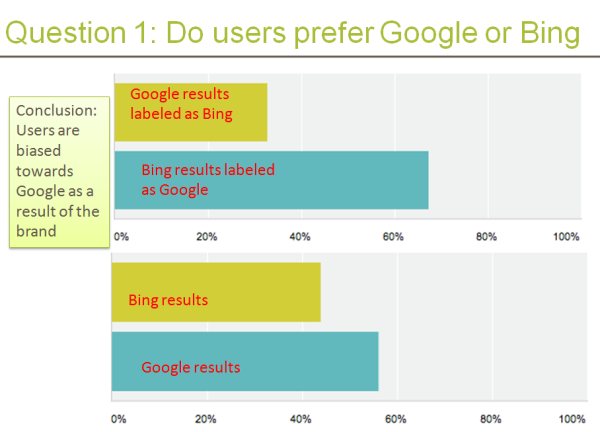Study: Many Searchers Choose Google Over Bing Even When Google’s Name Is On Bing’s Results
In a recent study by SurveyMonkey examining SEO assumptions, respondents were given two search result pages, one with a page header labeled “Google” and the other with a page header labeled “Bing,” and asked which page of results they preferred. Even when the page header labels were swapped, more users preferred the Google search results. […]

Of 641 survey respondents, 379 participants received a survey asking which of two search result pages they preferred. One page of results for the term “file taxes” included true Google results and the other page included true Bing results. The Google page was chosen by majority of the respondents.
A second survey was given to 262 participants. Using the same search term, respondents had to choose between a Google search results page and a Bing search result page. In this survey the SERP headers were swapped with Google results listed as Bing results and Bing results listed as Google results. Of the respondents who received the swapped search result pages, a larger percentage of respondents still chose Google results, even though they were actually Bing search results.
Not only did the survey find that users are biased toward Google, but they are influenced by a site’s brand as well. In a separate question, participants who received the first survey were asked to rate the believability of an article on CNN.com, while participants who received the second survey were asked to rate the believability of an article on a generic website, InternetNews.com. Respondents were more likely to rate the CNN.com article as believable.
Another key finding of the survey revealed that the No. 1 reason users would block a website from future searches if given the option was if the website contained too many ads.
The study, conducted using SurveyMonkey’s Audience tool, asked participants a number of questions based on general SEO assumptions. The audience was a random selection of males and females, age 18 to 60 from across the country with annual household incomes ranging from $25,000 to $150,000+ and varying education levels.
Contributing authors are invited to create content for Search Engine Land and are chosen for their expertise and contribution to the search community. Our contributors work under the oversight of the editorial staff and contributions are checked for quality and relevance to our readers. The opinions they express are their own.
Related stories
New on Search Engine Land

